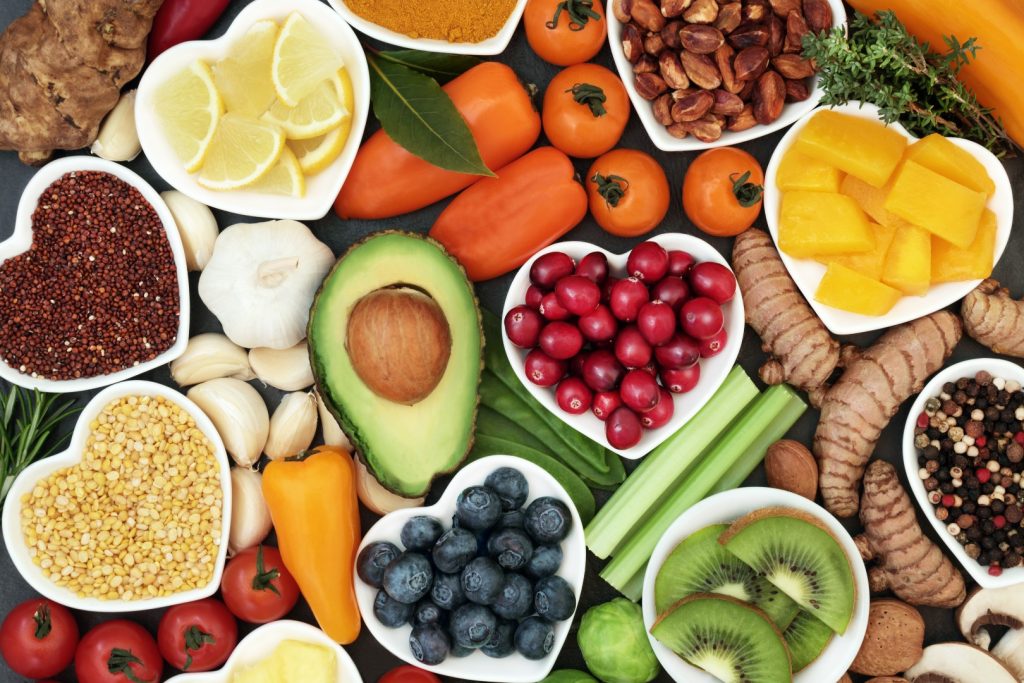3 Ways Processed Foods Keep Us Up At Night



Read more
Non-Dairy Cheeses and Yogurts
Claim Your Free eBook Now



Read more

Here are ten strategies for seasonal allergies or indoor IgE reactions like dust mites etc. Let’s talk about the plants, bacteria and other elements that can calm the mast cells or reduce histamine in the body.
Here are three antihistamine strategies that really don’t work for me:
1. Eating pollen. Not joking. Some folks recommended it and I tried it and I have to say um, no, not working.
2. Lemon, lavender and peppermint essential oils. Cleared my sinuses but no, kept sneezing. Also peppermint and anything with menthol has been shown to just make it FEEL like we are breathing better (and smell good) but not actually increase oxygen or decrease congestion.
3. Acupuncture. I wish this worked but it just didn’t 🙁 I will keep trying!
OK now onto what DOES work.
We must go deeper to the root cause.
If you are having springtime or full-time environmental allergies it is important to figure out why. So before getting into ten easy strategies for allergies that are already taking place I want to talk about an overarching plan. Taking away as many distractions for the immune system and then balancing it and removing the offending allergen are really all that are needed.
Taking away immune distractions means dealing with gut infections, sinus infections, tooth infections. It may mean doing a liver cleanse or a water fast to help with detoxifying or reducing those foods that can distract the immune system. This step may mean dealing with yeasts in the body. Even if you are a practitioner it can be very helpful to work with someone who can help you trouble shoot this systematically.
Balancing the immune system means communicating with the two main branches of immunity, the swat team and the pencil pushers as I like to call them, tH1 and tH2 immunity. These branches of the immune system usually come into balance after long term infections and irritants are resolved but if not then the careful use of some herbs can be helpful. For example mangosteen, cardamom, moringa, watercress, nettle and so on.
If allergies catch you by surprise here are ten useful strategies:

Read more


Read more

Here are five not-so-obvious warning signs that something may have gone wrong with your food. If you are experiencing any of these symptoms please check your foods for hidden ingredients, especially gluten if you are sensitive. I know there are more obvious signals that are unlikely to be missed like vomiting or losing consciousness but let’s focus on the warning signs for exposure that are likely to go unnoticed shall we?
1. Really really tired
Have you ever been really really tired? I’m talking about the kind of tired where you could sleep a full night of ten hours, get up for two, go back to bed for a nap, wake up for a while and then go back to bed at the end of the night? Tired where your arms and legs are really really heavy? Stay in your pyjamas all day? Or your yoga pants double as pyjamas for several days? If being tired is interfering with the flow and productivity of your day of course make sure you are sleeping well at night, check your thyroid levels and thyroid hormone conversion, check your adrenals but… all of these things could be off because you have been exposed to something. A toxin, an allergen, a chemical.. These insidious ingredients could be hiding in a supplement or food source or they could be in the environment surrounding you. Did you know that gluten free and even certified gluten free products can contain the rest of the wheat, just leaving out the gluten protein specifically? Yup. The point is if tiredness creeps up on you and is becoming a problem don’t get lost in blaming yourself for being lazy and don’t let time just pass you by while you are missing out on life. Make sure to double check your environment for mould and chemicals in your cleaning supplies. Make sure to check your supplements for hidden sources of ingredients that you are allergic or sensitive too. In my case the last exposure was gluten through supplements but I have also heard about this happening from seafood based ingredients or corn based ingredients in supplements. Take care of yourself. If you are too tired to live your life there is something wrong and chances are it’s not “your fault”.
2. Negative self talk
This one is a doozy. The truth is negative self-talk and mental patterns are very much influenced by our biochemistry. This is why when a person is experiencing depression they simply cannot think their way out of it. We all have tapes that play in our brains. Our ability to turn the tape off is completely dependent on the down-regulation of certain genes through good methylation and anti-inflammatory processes. Being stuck in a loop can be great for practicing a skill but is terrible when that loop is negative. Our brains get stuck in this differently depending on our genetic predisposition, current state of health, nutrition, digestive bacteria and triggers that activate genes more toward OCD tendencies. I have been fascinated by the chemicals created by yeasts and bacteria that can affect our brain function and nervous systems, for example Arabinose, Quinolinic Acid, D-Lactic Acid and Propionic Acid. These are just examples of some of the chemicals and substances that are very normal in our environment to help you see that this is not some far-fetched connection. If you notice changes in your thought patterns they could be caused by an imbalance of bacteria or a chemical or allergen in your environment or food. Again if this is interfering with your day-to-day activities it is not normal and there are answers. Of course it is a good idea to seek the help of a professional counsellor if you are experiencing damaging self-talk. We all need a little help. Don’t forget to check for hidden exposures that can change the way you are thinking however. Your brain doesn’t malfuncion. A person’s brain inclined to do this is a real benefit when looking for foods in the wild or keeping watch at night, real survival stuff. your brain is doing the best that it can to function and we must seek to find what is getting in the way and overstimulating certain pathways. Changing mindsets can be difficult when biochemistry is involved.
3. Brain fog
A mentor once asked, “Why do you use the term brain fog? Nobody knows what that is.” I said “Trust me. If you’d ever experienced it you would know exactly what … wait a minute… what was I talking about again?” Do you ever walk into the kitchen, open the fridge and then wonder what it was that you were supposed to be getting there? Do you ever wonder if you said something out loud or if it was just in your head? Tell me – right now – where are your keys? Brain fog. Again biochemistry and toxins can change the way our brains work. If you are already eating organic, avoiding the top allergens, getting regular exercise and sleeping enough perhaps the fuzzy-headedness is not a diet/lifestyle problem. Digestive bacteria can produce something called Lipopolysaccharides and if we have leaky gut they can create autoimmunity in many body systems including our brains and nervous systems. The lipopolysaccharides can even be found in Bacillus probiotics. Usually fine but maybe not with leaky gut. Eep and uck! Check your supplements!!! Check your environment!! We need your brain!!!
4. Body symptoms like rashes/weight gain/headaches
Any unexplained body symptom… take note of it. Not everything needs to lead to a full blown investigation for everyone. That being said if I get a weird rash or recurring headaches you can redouble your efforts (this time) to check for exposures. Rashes, weight gain and headaches can all be signs and symptoms of the body trying to rid itself of something and beginning to be overloaded. If you have a way to lessen the “bad’ stuff going in so that the body has time to recover you can help yourself. Some skin rashes and other body symptoms are of course bacterial, viral or something systemic that need to be seen by a doctor or specialist… but if they can’t tell you the CAUSE of the rash or headache do not just let it sit. Do not just accept strange symptoms as normal. Helping with phase 2 detox can help to reduce these symptoms and protect our livers but don’t ignore the signs from your body. For phase 2 detox you can look into turmeric and also the bacteria B. infantis and L. plantarum.
5. Stolen Digestive Chi
Not hungry? Stuck? Not feeling the fires of digestion getting you going in the morning or like ever? Our digestion is supposed to be activated in the morning. If you are not hungry in the morning and even throughout the day something is going wrong. Take every opportunity to resolve the problem before it contributes to something even less convenient. You know how to work on cleaning up your diet so add to that an investigation for hidden allergens or toxins that could be stealing your digestive fire. This can definitely happen. Remember if something is going wrong every day it is probably related to something that happens every day, a food or eating pattern, an exposure. Put yourself first and keep on digging.
If you are working with a practitioner there are three tests I would like to tell you about:
The Cyrex Array for gluten sensitivity:
https://www.cyrexlabs.com/CyrexTestsArrays/tabid/136/Default.aspx
The Great Plains Labs Organic Acid Test:
(giving information about substances like D Lactic Acid and Oxalates affecting your biochemistry)
http://www.greatplainslaboratory.com/organic-acids-test/
The Great Plains Labs Chemical Test:
(New but revealing, just to see how many chemicals are still floating around in our bodies even after choosing to eat organic)
http://www.greatplainslaboratory.com/gpl-tox/
I am a big fan of the following Vibrant Wellness tests for this specific investigation:
Mycotoxins
Food allergens
Food sensitivities
Gut zoomer 3.0
Please spend time thinking about whether something in your food or environment could be affecting your mental and physical health. It will make me feel like we can still help each other.
Read more
Keeping Positive Through Chronic Autoimmunity; An Interview with Maura Kennedy
Mindset. We’ve all heard our beliefs and outlook are critical to our health. Even my rheumatologist, brilliant at western conventional medicine told me that “if you are doing something that makes you unhappy for more than three hours a day you will eventually get sick”. I’m not sure how to quantify that and for the longest time the whole MINDSET piece was something I put off. You see for me it is easier to change my diet and go to pilates than to change my outlook.
But just how does our outlook actually affect our health?
First our outlook affects our willingness to try new approaches or take the actions required to reclaim our health. Hey if we already think something won’t work we’re not going to bother right? Or if we do bother we may not be bothering 100%, all in. Or if we try something with the expectation of failure that’s pretty much what will happen. As Yoda says, “There is no TRY”.
Secondly if our outlook contributes to overt or underlying stress then we will eventually experience its’ damaging effects. Stress can affect digestion and absorption, it can affect blood sugar regulation, cognitive function, pH, muscle breakdown, our adrenal glands and our thyroids… of course none of it in a good way.
Maura Kennedy has been an inspiration in her ability to stay positive no matter what she is feeling on a physical level.
In this interview you won’t find a sales pitch, you won’t find all the answers. You will find two friends talking about the struggles of chronic illness, relationships, recovery and state of mind. You will also find three simple things that you can do every day to help improve your state of mind.
Know that you are not alone.
See you in the interview below.
CLICK HERE to download the interview
Read more